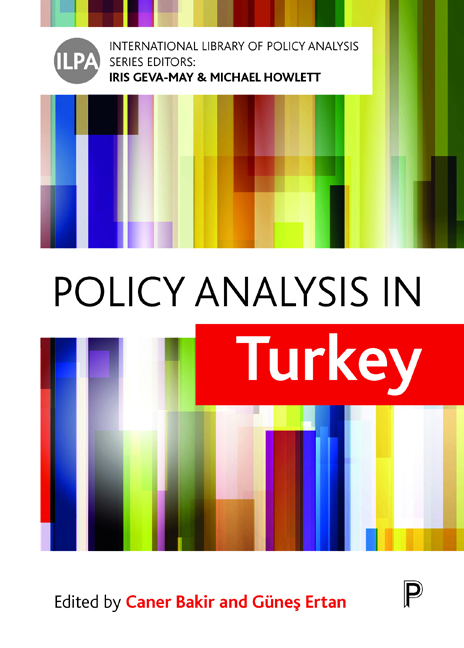Book contents
- Frontmatter
- Contents
- List of tables and figures
- Notes on contributors
- Editors’ introduction to the series
- one Pushing the pendulum from politics to policy: the state of policy analysis in Turkey
- Part One Historical roots, styles and methods of policy analysis in Turkey
- Part Two Policy analysis by governments
- Part Three Experts, international actors and public opinion
- Part Four Parties and civil society-based policy analysis
- Part Five Academic, bureaucratic and advocacy-based policy analysis
- Index
twelve - Policy analysis in civil society organisations
Published online by Cambridge University Press: 19 April 2022
- Frontmatter
- Contents
- List of tables and figures
- Notes on contributors
- Editors’ introduction to the series
- one Pushing the pendulum from politics to policy: the state of policy analysis in Turkey
- Part One Historical roots, styles and methods of policy analysis in Turkey
- Part Two Policy analysis by governments
- Part Three Experts, international actors and public opinion
- Part Four Parties and civil society-based policy analysis
- Part Five Academic, bureaucratic and advocacy-based policy analysis
- Index
Summary
Introduction
Studies on policy analysis are traditionally confined to public organisations. However, as governance practices are deepening all around the world, more and more non-governmental actors are gaining direct or indirect powers to influence policy-making processes, or are becoming service providers in various policy issue areas that used to be considered the sole domain of public organisations (Salamon, 2002). Hence, policy analysis practices in civil society organisations (CSOs) are also becoming an important question for policy studies.
Despite certain set-backs in the last few years, since the early 1990s, CSOs in Turkey have become considerably more visible and powerful actors in the policy process (Keyman and Icduygu, 2005). Putting aside the effectiveness of Turkish CSOs in shaping policy processes or in carrying out governmental services, this chapter is mainly concerned with providing a short synopsis of the state of civil society in Turkey, and an overview of CSOs’ decision-making processes by combining data from various empirical studies. We start by discussing the roots of weak civil society in Turkey followed by an illustration of the current state of civil society. In the following sections we examine policy analysis practices in CSOs with a focus on prevalent decision-making structures and the role of external funds, as well as agenda-setting and evaluation processes. We conclude by arguing that CSOs in Turkey are yet to become effective implementers of policy analysis tools.
A short historical overview of civil society in Turkey
It is almost common knowledge that Turkey is characterised by a very strong, centralised state tradition and a weak civil society. Heper and Yıldırım (2011) consider pervasive populism, clientelism, opportunism and personalism coupled with scarcity of tolerance, altruism and pluralism as the main explanations for the weakness of civil society in Turkey.
The roots of its weak civil society can be traced back to the power of the state and the bureaucratic elite during the Ottoman era (Mardin, 1969). According to Mardin (1969), the Ottoman ruler elite was mainly concerned with keeping control of a religiously and ethnically heterogeneous empire that was spread over a vast amount of land. Consequently, there was not much tolerance for the emergence of different interest groups (Heper, 2000).
Moreover, all of the land under the control of the empire legally belonged to the Sultan.
- Type
- Chapter
- Information
- Policy Analysis in Turkey , pp. 199 - 212Publisher: Bristol University PressPrint publication year: 2018
- 1
- Cited by

